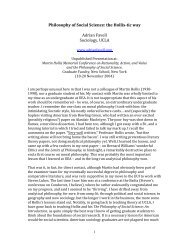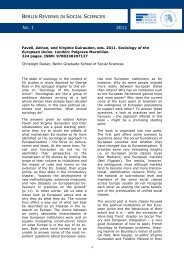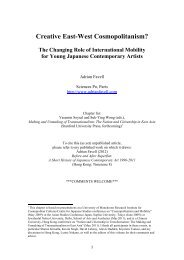Governmentality, political field or public sphere ... - Adrian Favell
Governmentality, political field or public sphere ... - Adrian Favell
Governmentality, political field or public sphere ... - Adrian Favell
Create successful ePaper yourself
Turn your PDF publications into a flip-book with our unique Google optimized e-Paper software.
508 European Journal of Social The<strong>or</strong>y 14(4)appropriate c<strong>or</strong>relate <strong>or</strong> foundation in European society. The essential problem here isthat national <strong>public</strong> <strong>sphere</strong>s possess a degree of persistence and grip on the conceptualizationof ‘n<strong>or</strong>mal’ representative politics, holding back a m<strong>or</strong>e th<strong>or</strong>oughgoing Europeanization(Wessler et al., 2008).The weakness in the <strong>public</strong> <strong>sphere</strong> approach lies in the fact it mostly only providesdescriptive material about this change and quantity in the Europeanization of <strong>public</strong>debates, not any real account of variation in national accounts <strong>or</strong> explanation of whythis happening. It also tends to reproduce the given terms of policy debates at nationaland international levels. In sticking with materials derived from <strong>or</strong>dinary nationalmedia, it ends up reproducing the national <strong>public</strong> <strong>sphere</strong> as a yardstick, even as it looksf<strong>or</strong> something different.On this point, the governmentality perspective can help. It reveals that the democraticdeficit is in fact not an objective reality but a new discursive <strong>field</strong> that is part of theprocess of making the EU ‘knowable’ and hence governable as an expanding space ofsocial, economic and <strong>political</strong> processes. It is, in sh<strong>or</strong>t, a discursively constructedproblem whose solution (seemingly) requires and demands (EU) governmental intervention;hence the argumentative justification of the interventions, and the strategies developedto tackle the problem regardless of voter opinion. To understand the EU as a site ofgovernmentality reveals the <strong>political</strong> technologies that are used in turn to make the ‘democraticdeficit’ discourse practicable on the EU level by aiming at ‘inserting democracy’into existing modes of government through the creation of governable entities (i.e., a‘European citizenry’) (Walters and Haahr, 2005). At the same time, the governmentalityperspective might provide <strong>public</strong> <strong>sphere</strong> research with the tools to reflect m<strong>or</strong>e explicitlyon the own n<strong>or</strong>mative yardsticks. It could inspire an empirical expl<strong>or</strong>ation of new f<strong>or</strong>msof <strong>public</strong> <strong>sphere</strong> on the EU level that might not c<strong>or</strong>respond to what we find on thenational level but nevertheless provide imp<strong>or</strong>tant linkages between the <strong>political</strong> systemof the EU and its society(ies) and citizens. Both approaches can w<strong>or</strong>k with the samekinds of discursive textual materials. This offers a clue to how ideas of governmentalitycan go beyond the re-analysis of top-down policy discourses, and start to show howmeso-level debates have also created European subjectivities, as well as discipliningthem to this new ‘higher’ f<strong>or</strong>m of liberal democratic politics. Not least, they can providea hint of how mentalities and technologies of EU government actually access the thinkingand perception of citizens who do not read official policy papers <strong>or</strong> directives but gettheir <strong>political</strong> knowledge from the media.Yet, as we know, the governmentality approach is not so good at putting a face on theoperation of power, <strong>or</strong> in pointing to where act<strong>or</strong>s are able to resist <strong>or</strong> subvert it. N<strong>or</strong> doesthe <strong>public</strong> <strong>sphere</strong> approach offer much to explain this. It is in the pinpointing of thevariable dynamics of agency and the interaction of <strong>political</strong> act<strong>or</strong>s that the micro-levelanalysis of the Bourdieusians excels. The <strong>political</strong> <strong>field</strong> approach reminds us there areobservable and distinct social <strong>field</strong>s within which these discourses and technologies areembedded, strategically used, adapted <strong>or</strong> resisted: by the individuals, groups, <strong>or</strong>ganizations<strong>or</strong> institutions that make European politics actually happen, the people who are constantlyconstructing, reproducing and transf<strong>or</strong>ming these emergent <strong>political</strong> structuresthrough their agency. This bottom-up approach shows that the question of the EU’s democraticquality is about much m<strong>or</strong>e than just the set-up of a supranational system of <strong>political</strong>





